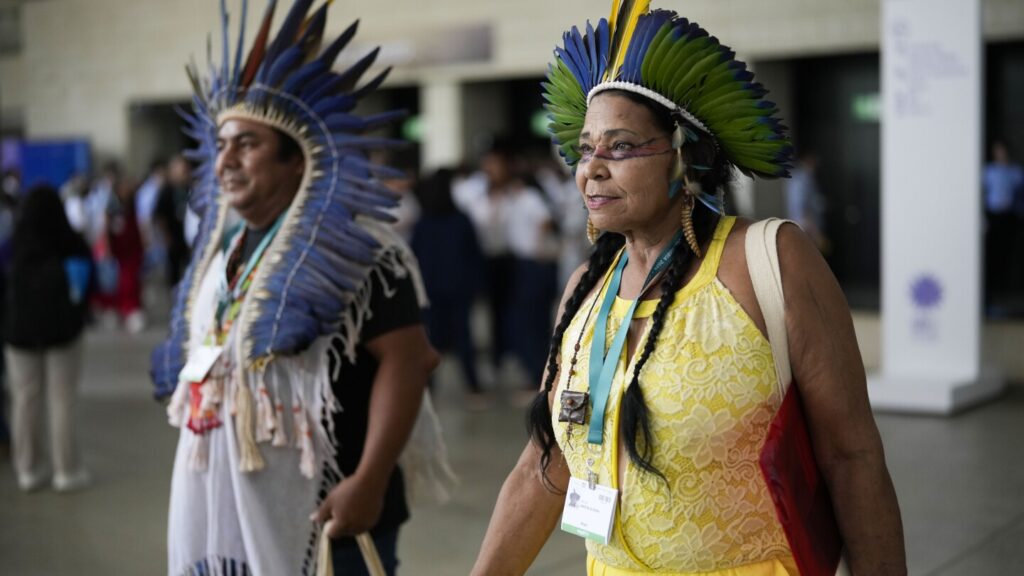CALI, Colombia (AP) – After two weeks of negotiations, delegates reached an agreement at a meeting on Saturday. United Nations Conference on Biodiversity and establishing a subsidiary body to include indigenous peoples in future decisions regarding conservation. This is a development that builds on a growing movement that recognizes the role of descendants of some areas’ original inhabitants in protecting land and combating climate change.
Delegates also agreed to require large companies to share the economic benefits of research in the use of natural genetic resources.
The announcement of the historic decision to create the subsidiary body was met with cheers and tears from indigenous delegates. Sushil Raj, executive director of the Wildlife Conservation Society’s Rights and Communities Global Program recognizes and protects traditional knowledge systems.”
“This will strengthen representation, coordination and inclusive decision-making and create a forum for dialogue with COP parties,” Raj told The Associated Press, referring to the meeting’s official name, the Conference of the Parties. spoke.
The negotiator is I had a hard time finding common ground. Agreement was reached on several key issues in the final week, but only after negotiations continued late Friday.
Afro-Colombian women perform during the opening ceremony of the United Nations biodiversity conference COP16 in Cali, Colombia, Sunday, October 20, 2024. (AP Photo/Fernando Vergara)
At the COP16 Summit held in Cali, Columbiafollowing the historic 2022 agreement in Montreal. Contains 23 bars Save the lives of the Earth’s plants and animals by protecting 30% of the planet and 30% of degraded ecosystems by 2030.
Measures were also adopted in Cali to recognize the important role of people of African descent in conservation.
According to the final document reviewed by The Associated Press, the indigenous organization will be organized by two co-chairs selected by the COP, one nominated by the regional group’s U.N. parties, and one with indigenous peoples. Nominated by community representatives. .
Representatives of Brazil’s indigenous peoples attend the opening ceremony of the United Nations biodiversity conference COP16 in Cali, Colombia, Sunday, October 20, 2024. (AP Photo/Fernando Vergara)
At least one of the co-chairs will be from a developing country, with gender balance in mind, the document said.
“This decision recognizes the value of traditional knowledge of indigenous peoples, Afro-descendant peoples and local communities, and settles 26 years of historic debt under the Convention on Biological Diversity (CBD).” Susana, Colombia・Mr. Muhammad said. The Environment Minister and COP16 President posted on social media platform X immediately after the announcement.
Who owns natural DNA was one of the most controversial and hotly negotiated topics at the summit, as tensions rise between poor and developed countries over digital sequence information (DSI) of genetic resources. Ta.
But negotiators agreed Saturday morning to bind large companies to share profits when using animal, plant and microbial resources in biotechnology.
“Many of the life-saving medicines we use today come from rainforests, so it’s only right that a portion of the revenue companies earn from this information goes back into conservation.” said Tris Jaeger, executive director of the Norwegian Rainforest Foundation. “This is the absolute highlight of COP16.”
The delegation agreed to a genetic information fee of 0.1% of a company’s revenue from products based on genetic information. The money will be directed to a new fund, with 50% of it going to indigenous communities.
“This will ultimately allow communities, including women and youth, to share in the benefits,” said Ginette Hemley, World Wildlife Fund’s senior vice president for wildlife.
An agreement to protect human health was also adopted. Increasing biodiversity issues on earth. Ecosystem degradation and loss of ecosystem integrity directly threaten human and animal health, environmental groups say.
FILE – Antelopes run through a national park and surrounding areas in South Sudan, June 18, 2024. (AP Photo/Brian Inganga, File)
Many argued that the conference as a whole had not made enough commitments, especially on the financial front.
The pledges made by countries over the past two weeks fell far short of the billions of dollars needed to tackle the dramatic decline in global biodiversity. Only $163 million was made in new commitments at COP16.
Nicola Sorsby, a researcher at the International Institute for Environment and Development, said: “The pledges that were made… were far removed from what they should have been.” “This is only 0.5% of the goal to be achieved within the next six years.”
This modest commitment does not bode well for the next Conference of the Parties to the United Nations Framework Convention on Climate Change (COP29), which will be held in Azerbaijan later this month. The focus of COP29 is expected to be on how to generate the trillions of dollars the world needs to transition to clean energy such as solar, wind and geothermal energy. Raising that money will require a massive effort by nations, businesses and philanthropies.
“Unfortunately, too many countries and UN officials are leaving Calipoli without the level of urgency or ambition needed to secure an outcome at COP16 to address our species’ most pressing survival issues. ,” said Brian O’Donnell, Nature Campaign Director.
At the Montreal Biodiversity Summit, rich countries pledged to raise $20 billion a year in conservation financing for developing countries by 2025, rising to $30 billion a year by 2030.
Global wildlife populations have declined by an average of 73% over 50 years, according to the October Living Planet report, published biennially by the World Wildlife Fund and the Zoological Society of London.
___
Follow Stephen Grattan on X: @sjgrattan
___
Associated Press climate and environment reporting receives funding from private foundations. AP is solely responsible for all content. Find AP standard Please see below for our philanthropic efforts, list of supporters and areas funded. AP.org.



